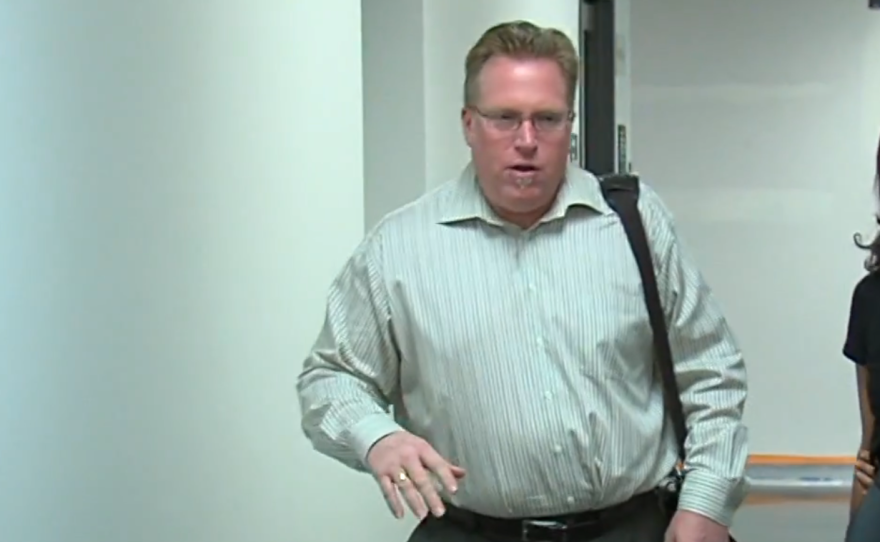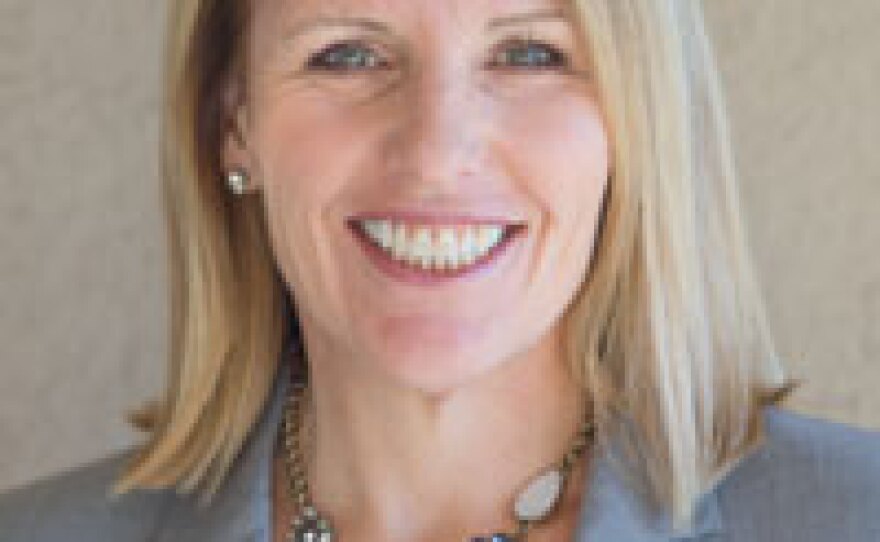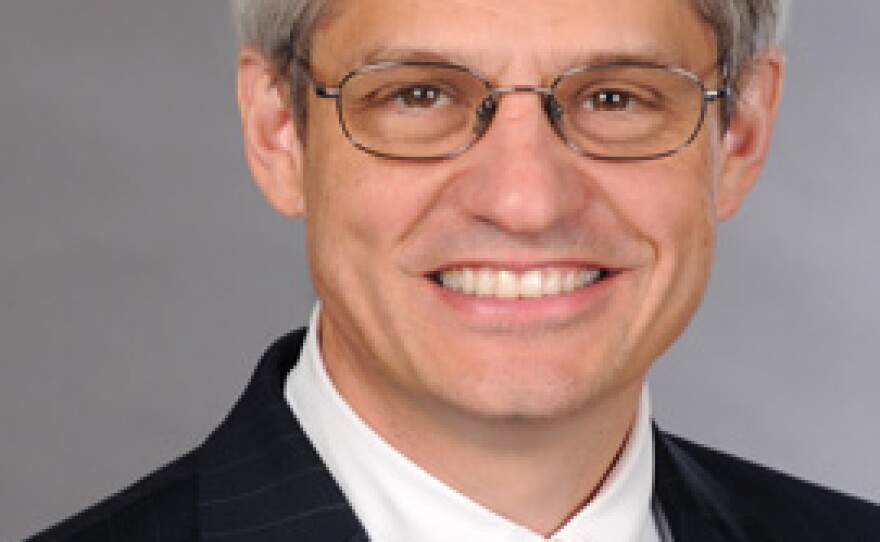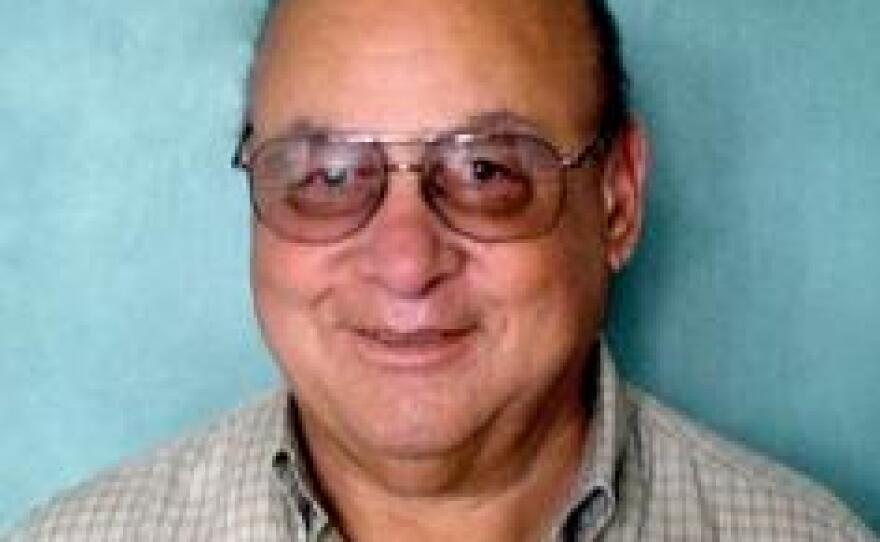San Diego environmental attorney Cory Briggs, dressed in a suit and tie, stood before the 9th U.S. Circuit Court of Appeals in February to argue against one of the most potentially transformative and divisive development projects in the city’s history — a proposed 12-acre property along the downtown waterfront.

But just as Briggs began his opening remarks, Judge Harry Pregerson interrupted, asking him for details about his client, the Navy Broadway Complex Coalition.
“Who do you represent?” he asked Briggs.
“The appellant, the San Diego Navy Broadway Complex Coalition,” Briggs replied.
“And can you name any people?”
“No,” Briggs said. “It’s a nonprofit 501 C three or four — I don’t remember which one — association with a bunch of members who live in the city of San Diego.”
In some ways, the lawyer’s confusion was understandable.
To see a comprehensive spreadsheet of the entire network of nonprofits, including each group’s status, officers and more, click here.
Briggs and his law firm have sued on behalf of more than 30 charitable nonprofits, almost all of which he and his family helped create. An inewsource review of public records found state and federal governments have suspended more than half of the groups, including the Navy Broadway Complex Coalition (which was later reinstated), for failing to file legally required documents showing finances, mission statements and board structures.
inewsource’s examination of Briggs’ nonprofits began in October 2014 and used publicly available information from corporate filings with the Internal Revenue Service, California Attorney General’s Office, California Secretary of State’s Office and the state Franchise Tax Board, as well as land records, lawsuits, depositions, social media accounts and blogs.
Nearly every one of the nonprofits lists public “education” as its primary mission, yet most have no presence outside of court. One of the charities appears to do nothing other than take money from donors, including a developer, while others exist only on paper. According to the most recent filings, at least a dozen of the nonprofits have illegal board structures.
One nonprofit governed by Briggs’ significant other and his cousin showed nearly a quarter million dollar loss with no explanation of where the money went.
Kristin Ford, spokeswoman for the California Attorney General’s Office, which regulates nonprofits in the state, wouldn’t comment on any specific nonprofit. But she said the “registration and reporting requirement is a critical element in the Department of Justice's efforts, through enforcement actions brought by attorneys in the Charitable Trusts Section, to protect the public against both improper diversion of charitable assets and misleading and fraudulent charitable solicitations.”
Network of nonprofits
Briggs is a big name in San Diego: He and his firm are often found in the middle of the city’s biggest legal battles involving land, government accountability and the environment, and for several months, inewsource has published a series of stories about him and the ethical and legal questions surrounding his business practices.
Briggs-associated nonprofit: A nonprofit that lists its physical address as Briggs Law Corp. in state filings and/or Briggs, his significant other or his cousin sit on the board of directors.
Most of the stories revolved around money: Briggs’ environmental lawsuits against the city of San Diego and the resulting settlements, now tainted by conflict-of-interest allegations; as well as his law firm’s multimillion-dollar home loans experts called questionable and possibly fraudulent.
This latest inewsource examination also shows Briggs has collected attorney fees and settlements on behalf of a network of charitable, nonprofit organizations he helped form that, in many cases, repeatedly and persistently violated state and federal laws.
All but two of the nonprofits have shared the same mailing addresses — that of the Briggs Law Corp. in San Diego or Upland. One also listed a P.O. Box in Ocean Beach.

According to the most recent filings, Briggs’ cousin Karin Langwasser and Briggs’ significant other, Sarichia Cacciatore, are on the boards of at least 10 Briggs-associated nonprofits, which are either 501c3 or 501c4 public charities.
Thirty of the Briggs-associated nonprofits mention “education” or “educating the public” as part of their primary mission — 19 use exactly the same mission statement: “The specific purpose for which this corporation is organized is the promotion of social welfare through advocacy for and education regarding responsible and equitable environmental development.” Another’s is only slightly different.
In the past decade, the state attorney general has sent nearly 100 notices to the nonprofits to register or be revoked.
Nonprofit experts interviewed said Briggs’ network of charities suffers “a serious case of noncompliance.” A forensic accountant said several of the filings were “egregiously wrong.”
Judges, attorneys and municipal officials have long questioned Briggs’ motivations in using the tax-exempt organizations to collect substantial attorney fees during the past decade. A law firm can’t seek damages on its own. It needs a client who has actually been damaged. The San Diego City Attorney’s Office is currently trying to persuade a judge in Superior Court that one of Briggs’ most litigious nonprofits, San Diegans for Open Government, is a “mere alter ego” of its counsel.
San Diegans for Open Government filed a suit against the city of San Diego in 2013 challenging its approval of business improvement district assessments. In a motion filed in March, the city laid out a series of points arguing that the nonprofit is an “alter-ego of Briggs Law Corporation” and the firm uses the group “to litigate for profit.” It backed up the claims with more than 1,200 pages in a three-volume compendium filed with the San Diego Superior Court.
Briggs did not respond to an emailed interview request on May 15, which included details about the main elements of this story. On May 9, Briggs emailed inewsource’s lawyer requesting a “discontinuance of contact” with inewsource reporters due to the “ethical impropriety of such communications.” inewsource’s lawyer responded on May 14 saying “neither I nor my client inewsource consider inewsource's requests for you to comment for news stories to be in violation of any law or ethical prohibition.”
Briggs, Cacciatore, Langwasser, and Briggs’ associates, who taken together account for the bulk of most of the organizations’ boards of directors, did not answer requests for interviews.
San Diegans for Open Government
One of Briggs’ most frequent clients, which has filed more than two dozen suits against the city of San Diego, is San Diegans for Open Government — a nonprofit formed in 2008 to “promote social welfare” regarding “responsible and equitable environmental development.” Its high-profile cases have fought hotel and business improvement district taxes and demanded access to public records such as government officials’ emails.
Although it formed in 2008, San Diegans for Open Government didn’t provide the state attorney general’s charities division with five years’ worth of state or federal filings until April 2014, after the division threatened to revoke the group’s tax-exempt status.
Its officers have stated under oath that Briggs Law Corp. oversees and pays for nearly every aspect of the group’s operation:
According to depositions and other court filings, Briggs and his firm hold and maintain all the group’s corporate records; file and pay for its lawsuits, its annual registration fees and filings with the state and federal governments; control its Facebook and Twitter accounts; and collect all settlements and judgments when the group prevails in court.
San Diegans for Open Government doesn’t have a penny to its name — nor has it recorded any revenue or expenses with the federal or state agencies, according to government records.


Ofer Lion, a partner at Seyfarth Shaw in Los Angeles and member of the American Bar Association’s Exempt Organizations Committee, looked over the group’s state and federal filings, as did Reynolds Cafferata, a nonprofit lawyer and partner at Rodriguez, Horii, Choi & Cafferata in Los Angeles. Both are recognized experts in the field of nonprofit law.
Lion and Cafferata both found the organization’s lack of transparency and failure to file legally required documents problematic. Lion said the group’s failure to report any income since its formation despite being awarded hundreds of thousands of dollars — if not more — in court settlements over the years, is “really a disclosure and transparency problem at heart.”
inewsource asked the state Attorney General’s Office if it was looking into the matter, and a spokeswoman responded that the office “can't confirm or deny our investigations in order to protect the integrity of those investigations.”
The group’s mission
San Diegans for Open Government started out nearly seven years ago as the All People’s Breakfast Organizing Committee, with the late activist and environmentalist Ian Trowbridge at one point serving as its CEO, secretary and treasurer.
Under state law governing charities, it’s illegal in California for one person to serve as a nonprofit’s CEO/president while also serving as its secretary or treasurer in order to discourage the public benefit corporation from being used for personal gain. At least 12 Briggs-associated nonprofits show an illegal board structure in their most current filings, including one in which Briggs held both positions and another in which his cousin did.
The All People’s Breakfast Organizing Committee, which shares the exact same mission statement as 19 other Briggs-associated nonprofits, changed its name to San Diegans for Open Government in 2009.
That year, the group challenged the city’s use of an emergency exemption from the California Environmental Quality Act for maintenance work in the Tijuana River Valley. In the years since, the nonprofit has filed dozens of lawsuits, many against the city. Briggs Law Corp. has represented the nonprofit in every court case it has filed with the exception of a suit against inewsource, filed less than two months after its series on Briggs began.
After Trowbridge died in 2013, Briggs’ associates and family were appointed to the board of San Diegans for Open Government. The group’s policy states it will “maintain the privacy of its members and personnel to the maximum extent permitted by law,” and Briggs has vigorously defended that privacy in court.

Its board members include: Langwasser, Briggs’ cousin, who has been on the board of at least eight other Briggs-associated nonprofits; Richard Lawrence, a retired pastor, civil-rights advocate and friend of Briggs who has been on the board of at least ten other Briggs-associated nonprofits; and Pedro Quiroz Jr.
Theresa Quiroz is a member of multiple Briggs-associated entities, including CREED-21, and sat on San Diego’s 2010 Redistricting Commission.
Sarichia Cacciatore, Briggs’ partner and a former environmental biologist who serves on three Briggs-associated nonprofit boards, was listed as a member of San Diegans for Open Government in a 2012 lawsuit against the city. Briggs said Cacciatore was included in the lawsuit “by mistake.”
Nevertheless, a signed two-page declaration with details about her standing as an apartment owner was included in the group’s court filings. Seven months later, in a related deposition, Cacciatore said she knew nothing about the organization’s mission.
Other members who have appeared in court filings over the years include Linda Perine, director of community outreach under former San Diego Mayor Bob Filner; Dell Cunamay, Trowbridge’s partner before he passed away; Diane Faulds, a bookkeeper and tax preparer; and Mat Wahlstrom, a general manager of an electrical company in Hillcrest.
The primary purpose of San Diegans for Open Government, according to its filings with the California Attorney General’s Office, is to promote social welfare through advocacy and education. But its most prominent public function has occurred as a client of Briggs in cases pushing for open government and compliance with municipal and environmental laws. The group hosted an “open government bootcamp” in Chula Vista in March.
As a charitable organization, San Diegans for Open Government is required under federal law to adhere to the mission it proposed to the IRS to obtain tax-exempt status.
When asked during a deposition how the group educates the public, Quiroz, the CEO, answered, “Well, it’s what is put on the — I kept saying — Facebook. What I’m trying to say is the Internet, articles, accomplishments, links, that type of thing.”
San Diegans for Open Government’s officers meet regularly, Lawrence, its secretary, said in a deposition, but despite the group’s bylaws requiring it, they keep no record of meeting minutes — one of the “Top 9 Ways to Get Investigated” according to the California Attorney General’s Office — nor annual reports. The treasurer, Langwasser, said she had never attended a board meeting.
“Over the years,” Langwasser said during a deposition, “I haven’t been asked to do anything.”
Who filed the tax returns?
“Cory’s office,” she said.
However, her signature appears at least 10 times on documents the group has filed with state agencies. On at least one occasion, the city of San Diego has written a check to Briggs Law Corp. Trust Account “FBO [for the benefit of] Karin Langwasser” for Briggs’ attorney fees.
The money
San Diegans for Open Government has no checking or savings account because it wants “to operate as simply and cleanly as possible,” said its secretary, Richard Lawrence, during a court deposition.
In an open letter posted on the nonprofit’s blog on June 12, 2014, Lawrence and Quiroz explained the group has,
“...never accepted money in case settlements or in judgments we have won. The media and losers of those cases claim that Mr. Briggs has made himself rich from our cases. But what really happens is simple. When we lose a case, Mr. Briggs does not get reimbursed for his time or expenses. He is willing to risk substantial loss to fight the well-funded groups he takes on for us. When we win a case … Mr. Briggs is reimbursed for appropriate legal fees.”
Cafferata, the nonprofit lawyer, told inewsource, “That really isn’t how it works.”
Here is how he said it is supposed to work: When a lawyer takes a case on a contingency basis — as the arrangement between Briggs and San Diegans for Open Government appears to be — he usually requires no money up front in the hope that if he wins, he’ll get a percentage of the settlement or reimbursement of attorney fees. Typically, according to Cafferata and Lion, that percentage can be as high as 40 percent. The plaintiff would keep the other 60 percent. Judges typically take issue with a lawyer keeping more than 50 percent, Lion said.
A case against San Diego developer Sunroad Enterprises, in which Briggs represented San Diegans for Open Government and another nonprofit, CREED-21, which counts Langwasser and Lawrence as officers, resulted in a $135,000 “settlement of all claims.” Court records show the check was to be made payable to Briggs Law Corp. Trust Account, which lawyers typically use to hold money for clients, but neither group has reported revenue to the state Attorney General’s Office.
Since 2011, records show, the Briggs trust account has recovered nearly $250,000 from the city alone through lawsuits filed on behalf of San Diegans for Open Government.
But settlements involving private companies sometimes are kept secret, meaning it’s sometimes impossible to know how much money he and his network of nonprofits might have been awarded in lawsuits against developers. The nonprofits Briggs has represented in those cases do not list assets or revenue in their state filings.
Because no money is being reported — “and it really should be,” Lion said — these nonprofits wouldn’t be targeted for an automatic government audit.
“There’s nothing really for the IRS to latch onto,” he said.
Southwest Center on Renewable Energy
Another nonprofit associated with Briggs is a 501c3 called the Southwest Center on Renewable Energy, or SCORE. It appears to exist only on paper, despite reportedly raising more than $855,000 in contributions and grants since its inception and spending more than $450,500 on “research,” “advocacy” and “organizing.”
After an extensive online search, inewsource found the name of the group only in one place — its government filings.
SCORE’s governing board is comprised of Briggs’ partner, Cacciatore, his cousin, Langwasser, and his associate, Bill Powers, a prominent environmentalist and advocate for solar energy. It was incorporated in 2008 and Briggs is listed in federal filings as the person in charge of its books. Like 33 other Briggs-associated nonprofits, SCORE shares an address with Briggs Law Corp.
According to its filings with the IRS, SCORE was formed “to provide public education regarding the availability and feasibility of renewable energy resources in place of traditional, carbon-based energy resources,” and had big plans for the future:
The group’s IRS application said it would provide educational materials and training sessions. Its directors would work “approximately 50 hours per month.” It would hire an executive director earning a $100,000 salary and solicit funding “primarily through grants from government agencies” and private sources.
According to its application for tax exemption dated May 2009, SCORE received a $250,000 donation “from a developer to promote more renewable energy in land-use proposals.” The developer was not identified (nonprofits generally are not required to disclose donors). The next year, the group reported spending $20,000 on “consulting fees.” However, the zero-dollar balance at the end of that year gave no explanation as to where the remaining $230,000 went, as required by federal law.
After several warnings, the state Attorney General’s Office suspended SCORE in 2014 for failing to file disclosures, and the group’s status remains “delinquent,” according to the attorney general’s website.
The group did file 2013 and 2014 returns showing it received $605,171 in contributions during those two years, and spent $184,490 on “research” and $266,011 on “advocacy and organizing.”
Langwasser, a certified public accountant, serves as SCORE’s chief financial officer.

Paul Scott, a forensic certified public accountant and co-founder of Full Spectrum Consulting in Carlsbad, examined the group’s filings with the IRS. He called them “egregiously wrong.”
“That’s an invasion on the entire profession when I see CPAs doing this kind of work,” Scott said. “Clearly they’re out of integrity.”
SCORE’s chief executive officer, Bill Powers, did not respond to multiple phone messages. Neither Cacciatore nor Langwasser responded to requests for interviews.
To see a comprehensive spreadsheet of the entire network of nonprofits, including each group’s status, officers and more, click here.






